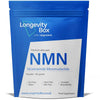What exactly is NMN?
NMN is short for nicotinamide mononucleotide, a naturally sourced molecule contained in all species. Around the molecular level, this is a ribonucleotide, a fundamental structural unit from the nucleic acid RNA. It is made up of nicotinamide group, a ribose, and a phosphate group.

NMN is really a precursor of nicotinamide adenine dinucleotide (NAD+), a molecule that may be valuable in scaling down some elements of aging. NAD+ serves many critical functions in your cells, like electron transport, cell signaling, and DNA repair.
Accumulating evidence suggests that as we get older, our degrees of NAD+ decline, increasing our chance of age-related diseases.
This is when the NAD+ precursor NMN comes in. Some researchers feel that as we can restore that lost NAD+, we will not simply slow aging but in addition delay various age-related diseases. Whether or not restoring NAD+ metabolism in humans will decrease aging or support healthy longevity continues to be an unanswered question, although animal information is promising.
What foods contain NMN?
NMN is found naturally in foods such as avocado, broccoli, cabbage, cucumber, and edamame. This is how much NMN is located in some common foods.
While these types of foods are full of nutrition, dietary NMN supplements can be found. These supplements typically can be found in doses which can be between 100 – 500 mg, although an ideal dose has to be determined in people.
Fasting and caloric restriction also apparently increase NAD+ levels and increase the activity of sirtuins, aka the longevity genes. It is suggested their activity relies on the presence of NAD+. In mice, fasting boosted NAD+ levels and sirtuin activity, and yes it appears to be decrease aging.
For more info about https://longevitybox.co.uk/ take a look at this website

